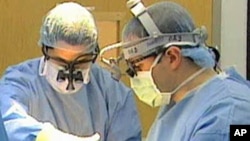A simple maternal blood test might someday be able to tell pregnant women whether the children they are carrying have diseases. The test would screen for more disorders than current prenatal tests, and researchers say it would be much safer.
Scientists say they have found a way to isolate a growing fetus' hereditary DNA from the plasma, or liquid portion, of the mother's blood and construct a genomic map of the fetus.
Researchers report being able to decode 94 percent of a developing fetus' genome from a sample of maternal blood, searching for disorders that are currently not detected with the two available prenatal screening tests. Those tests -- amniocentesis and chorionic villus sampling -- are considered invasive and carry some risks to the mother and the developing fetus.
With amniocentesis, a doctor uses a long needle to extract a sample of fluid from the womb at around 20 weeks gestation to test for chromosomal abnormalities, infections and metabolic defects. But there is a risk of fetal injury and miscarriage, as there is with chorionic villus sampling.
Dennis Lo of the Chinese University of Hong Kong says women who undergo that procedure, in which a sample of placental tissue is taken to examine for chromosomal mutations, run a one percent chance of miscarriage -- even if the baby is normal.
"So pregnant women, when they undergo those tests, will usually have a lot of psychological stress," Lo said. "So basically, our technology will bring [i.e., make] prenatal testing safer for the babies and less stressful for the mothers."
There are 46 chromosomes in the nucleus of a human cell, with each parent contributing 13 chromsomes. Chromosomes are long segments of DNA instructions.
Amniocentesis and chorionic villus sampling look for chromosomal abnormalities. It is a crude screening tool compared to what might be possible with analyzing the letter sequences of fetal DNA.
In what researchers call a "proof-of-concept experiment," Lo and a team of scientists assembled a fetal genome from fragments of DNA from the blood of a pregnant woman who, along with her husband, carried genes for a life-threatening form of anemia, a shortage of oxygen-rich red blood cells.
According to Lo, researchers were able to detect genetic abnormalities in the fetus.
"So this is a breakthrough in this paper. In the first half, we show that the entire fetal genome is there," Lo said. "In the second half, we actually sample the fetal genome and scan it for [a] disease the baby may have."
Lo says a prenatal test that scours the billions of letters comprising the fetal genome are prohibitively expensive -- around $200,000 dollars. But he says the goal is to develop prenatal screening that targets particular genetic abnormalities within certain populations.
"For example if you look at Southeast Asia, then there's a whole bunch of genetic anemias which are common here," Lo said. "In the Caucasian population, you can screen for the hundreds of mutations which are causing cystic fibrosis. In an African population, you can use this to detect sickle cell anemia. So the applications for this are numerous."
Lo predicts that scientists eventually will develop a fetal DNA test that can be used as early as nine weeks into pregnancy. An article describing the fetal DNA test is published this week in the journal Science Translational Medicine.
Scientists Work on Fetal Test Using Mothers' Blood









